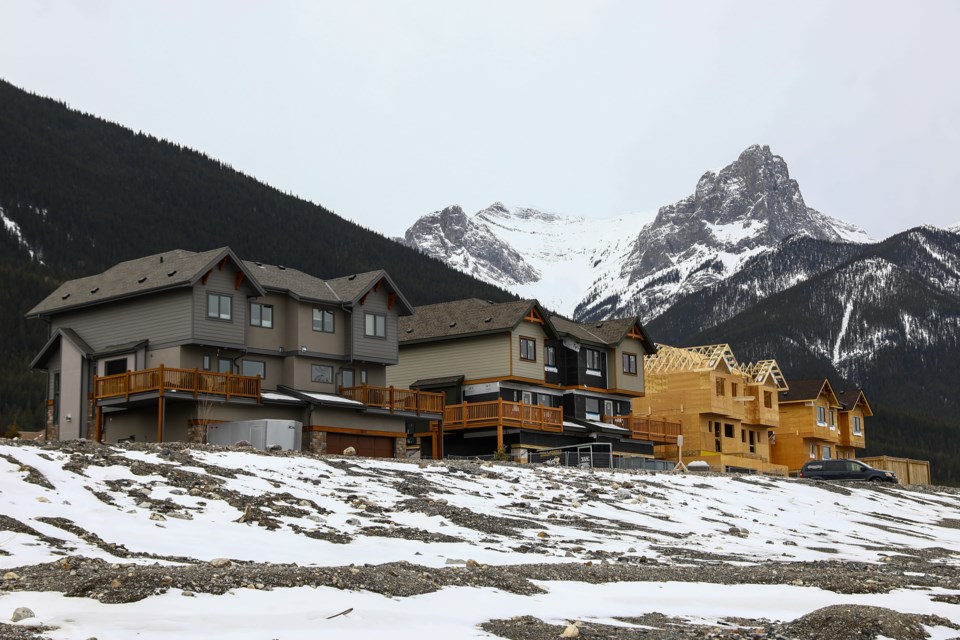CANMORE – The dates for the Land and Property Rights Tribunal between the Town of Canmore and Three Sisters Mountain Village have been set.
In a Dec. 6 decision order from the Land and Property Rights Tribunal (LPRT) – issued by the panel’s presiding officer Heesung Kim – the hearing dates are scheduled to take place between Feb. 22 to March 31.
The decision lists the Feb. 22-24, Feb. 28-March 3, March 7-10, 21-24 and 28-31 as the dates to hear the appeal on Three Sisters Mountain Village Property Limited’s (TSMVPL) Three Sisters Village and Smith Creek area structure plans (ASP).
The Smith Creek ASP will be heard first, followed by the Three Sisters Village ASP, with Kim and lawyers Debi Piecowye and David Thomas deciding on the hearing for the LPRT.
Representatives for both the Town of Canmore and TSMVPL declined comment due to the ongoing nature of the tribunal.
The Dec. 6 decision order was made following written submissions received on Dec. 3. The decision noted the Town and TSMVPL agreed to hearing dates and disclosure deadlines on Nov. 23.
While the Town and TSMVPL were able to agree on hearing dates and disclosure deadlines on Nov. 23, the decision order showed TSMVPL asked the LPRT to set dates and disclosure deadlines with the intervenors since they were unable to do so.
Disclosure refers to the rules and procedures in the two parties exchanging information to help prepare for the proceedings. Both sides have a legal obligation to disclose all relevant information.
The LPRT permitted limited intervenor status to Yellowstone to Yukon (Y2Y) Conservation Initiative, the Stoney Nakoda Nation and the Natural Resources Conservation Board (NRCB) on Oct. 25. The third-party status left the three groups with the ability to make submissions on limited points and none are allowed to ask questions of either the Town of TSMVPL.
The Stoney Nation is allowed to make submissions on how the ASPs and the NRCB decision are interpreted with changes since 1992 and how those impact the ASPs.
Y2Y is permitted to make submissions on the provincially approved wildlife corridor and its consistency with the NRCB approval. The NRCB is an intervenor to help with any interpretations of the NRCB Act.
The Town has a disclosure deadline of Dec. 24 for jurisdictional questions, while TSMVPL is Jan. 21, 2022. The NRCB’s deadline is Jan. 31, while the Town and TSMVPL’s reply to any NRCB submission is Feb. 15.
For the merits hearing, TSMVPL has a Dec. 24 deadline. The Town is Jan. 28, 2022, while the NRCB is Feb. 7 and TSMVPL’s reply is Feb. 15.
Y2Y and Stoney Nakoda Nation were originally scheduled for the Dec. 24 deadline, but they successfully argued for a later deadline to ensure their submissions were different from other parties. Y2Y didn’t ask for a specific deadline, but for it to be after the Town’s Jan. 28 deadline.
The Stoney Nakoda Nation also asked for additional time due to previously set deadlines in unrelated Court of Queen’s Bench hearings. They requested Jan. 31 or Feb. 7 on the basis they should be able to review the disclosures of both the Town and TSMVPL before submitting.
While the LPRT agreed to extend the Stoney Nakoda Nations and Y2Y’s deadline past Dec. 24, it pushed it to Jan. 7, 2022 – about four weeks earlier than asked for by both parties.
“The LPRT agrees that due to the unknown content of the intervenors’ submissions, it would be unfair to TSMVPL not to allow sufficient time to review and respond to those submissions,” the order read. “The LPRT accepts TSMVPL’s position that it requires time to respond to the intervenors that does not overlap with the time required to respond to the Town’s submissions.
“To that end, allowing an additional two weeks, to January 7, 2022, strikes a reasonable balance between allowing the intervenors enough time to prepare their submissions and allowing TSMVPL enough time to review and respond, while at the same time ensuring the appeals are heard in a timely fashion.”
The first preliminary hearing was held Sept. 3 and the subsequent one was Sept. 30. The tribunal is a quasi-judicial board.
TSMVPL filed for the hearing on July 9 for Smith Creek and on Aug. 9 for Three Sisters Village. The company made the filing under Section 619 of the Municipal Government Act. Once made, the hearing legally had to begin within 60 days and when it’s completed, a decision has to be made 30 days following the hearing ending.
TSMVPL has also filed a judicial review for both ASPs, which has been granted by the Court of Queen’s Bench, but has been adjourned sine die, meaning there is no timeline for it to be heard.
The Town attempted to have the appeal dismissed based on Section 619 predating the 1992 NRCB decision, Smith Creek not being a statutory plan amendment in the 1992 decision and the Thunderstone Quarry lands not being consistent with the NRCB decision.
The attempt was denied by the tribunal. Under Section 619, the tribunal can only hear from the appellant and the municipality unless intervenor status is allowed.
If the LPRT reverses Canmore council’s decision, the amendments made during second reading for the Three Sisters Village ASP would not be considered since it was voted down and the original ASPs are only under tribunal consideration.
Both sides could also appeal a decision made by the tribunal.




